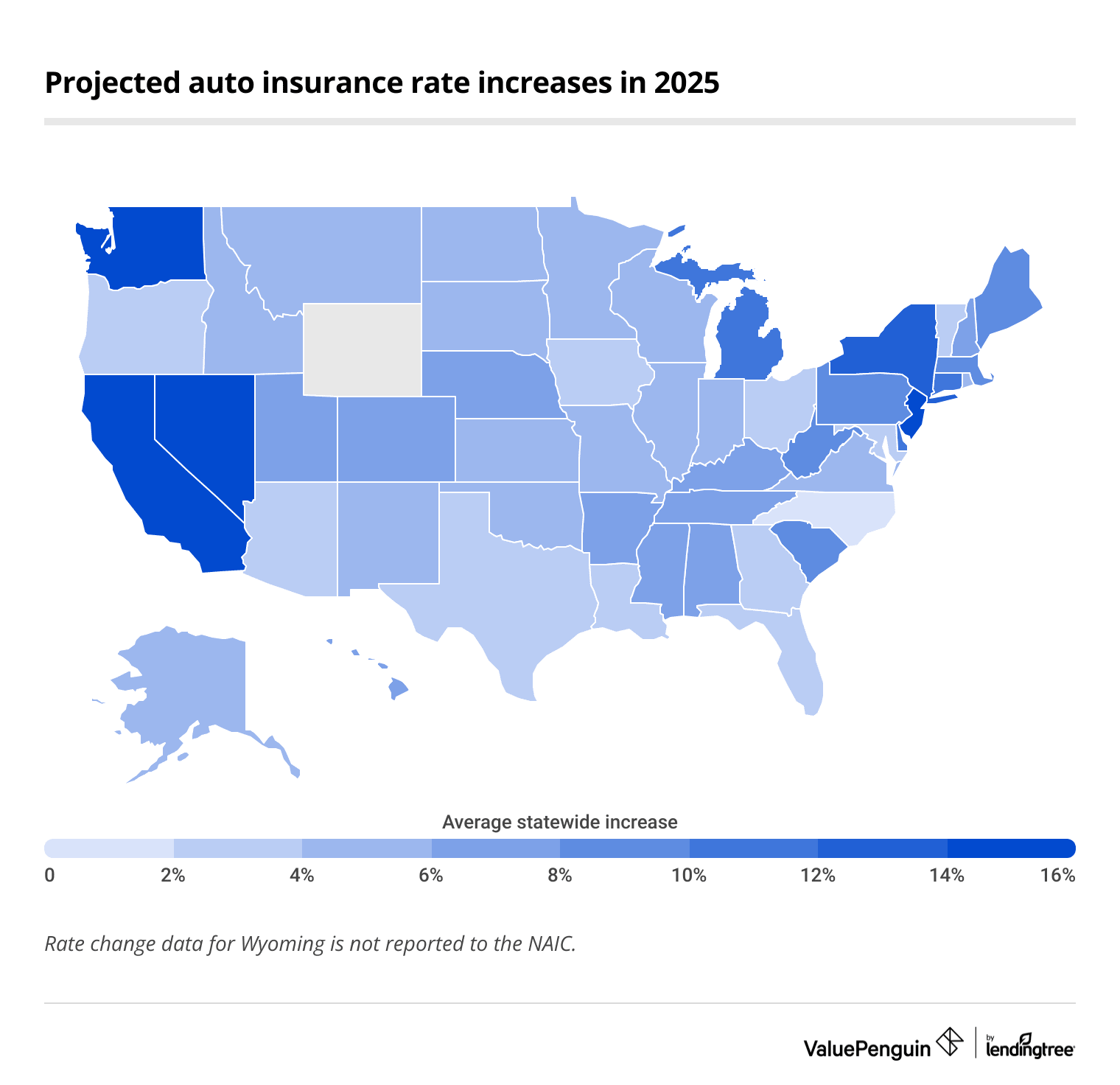Sierra Sandbox Study Pro
Average car insurance rate changes in 2025
Car insurance costs are expected to increase by 7.5% across the US in 2025.

While drivers across the country can expect to pay an average of 7.5% more in 2025, price jumps vary significantly across the country.

New Jersey, Washington and California drivers can expect to see the biggest jumps the next time they renew. New Jersey and Washington have estimated increases of 17.2%, while California residents will see a 16.2% increase, on average.

Only one state — North Carolina — has an expected rate drop in 2025 (0.1%). That means residents of the Tar Heel State are the most likely to see no change, or even a slight drop, in their insurance rates next year.

The Bureau of Labor Statistics reported that consumers paid an average of 19% more for car insurance in 2024 than in 2023, though that also includes increased coverage amounts and higher vehicle replacement costs.



2025 rate increases by company
The rate increases drivers will face in 2025 can also differ by company. American Family is set to hike its rates the most among major insurers, with a massive 16.0% increase.
Meanwhile, USAA drivers can expect an average of 2.6% increase over the next year. Geico and Progressive are also raising rates only a small amount in 2025.

Insurer | Average rate increase | |
|---|---|---|
| American Family | 16.0% | |
| Allstate | 11.2% | |
| Liberty Mutual | 10.2% | |
| Nationwide | 9.7% | |
| Farmers | 9.6% |
2025 car insurance trends

Inflation is down...
Inflation has fallen to just over 3% for the last half of 2024. A major driver of car insurance price hikes over the last three years was the cost of repairs, so falling inflation means insurance price increases may continue to slow.
Financing options are also improving, bringing down the overall cost of insuring a new car in 2025.
But tariffs may increase rates.
However, if President-elect Donald Trump goes forward with his plan to impose tariffs on imported goods, insurance rates may increase again.
About 60% of replacement car parts are imported from other countries. Higher parts costs mean higher repair prices, which would likely result in higher premiums.
Trump has posted on social media that he intends to cut car insurance rates, but there's not much he can do to directly influence prices. Insurance companies set rates in tandem with individual states, without input from the federal government.
How can I save money on auto insurance in 2025?
While the impact of inflation and regulation changes on car insurance in 2025 may be uncertain, how to save is not.
SHOP AROUND

The most important thing any driver can do to save money on their car insurance is to compare prices from multiple companies — at least five insurers, or more if you have a recent incident. Doing so can save drivers more than $100 each month.
IMPROVE YOUR CREDIT SCORE

Insurers in almost every state use your credit score to set car insurance rates. A driver with good credit can bring their rates down from $341 to $175 per month compared to one with bad credit.
So paying your credit card on time and consolidating your debts will help you save each month on car insurance.
LOOK FOR DISCOUNTS

Insurance companies give you discounts for taking actions that make you less risky to insure.
Drivers in some states can also take a safe driving course to drop your rates, no matter which insurance company you have or whether you've recently gotten a ticket. For example, all drivers in New York can take an online course to save 10% on their insurance for three years.
Another effective discount is to bundle your home and auto insurance. That can save you between 11 and 24% among top insurers.
Editorial Note: The content of this article is based on the author's opinions and recommendations alone. It has not been previewed, commissioned or otherwise endorsed by any of our network partners.





